- Home
- Dan Simmons
Olympos t-2 Page 2
Olympos t-2 Read online
Page 2
Achilles. Now appeared that traitorous monster walking only a step behind weeping Hector, who kept pace just behind the bier, cradling his dead brother’s head in his two huge hands.
At the sight of Paris’s body, a great moan went up from the thousands of Trojans massed on the walls and within the square. Women on rooftops and the wall—lesser women, not the females in Priam’s royal family or Helen—began a keening ululation. Despite himself, Menelaus felt goosebumps break out on his forearms. Funeral cries from women always affected him thus.
My broken and twisted arm, thought Menelaus, stoking his anger as one would stoke a fading bonfire.
Achilles—this same Achilles man-god passing now as Paris’s bier was solemnly carried past this honor-contingent of Achaean captains—had broken Menelaus’ arm just eight months earlier, on the day that the fleet-footed mankiller had announced to all the Achaeans that Pallas Athena had killed his friend Patroclus and carried the body to Olympos as a taunt. Then Achilles had announced that the Achaeans and Trojans would no longer make war on each other, but besiege holy Mount Olympos instead.
Agamemnon had objected to this—objected to everything: to Achilles’ arrogance and usurpation of Agamemnon’s rightful power as king-of-kings of all the Greeks assembled here at Troy, to the blasphemy of attacking the gods, no matter whose friend had been murdered by Athena—if Achilles was even telling the truth—and had objected most to the fact that tens and tens of thousands of Achaean fighters being put under Achilles’ control.
Achilles’ response that fateful day had been short and simple—he would fight any man, any Greek, who opposed his leadership and his declaration of war. He would fight them in single combat or take them all on at once. Let the last man standing rule the Achaeans from that morning forward.
Agamemnon and Menelaus, the proud sons of Atreus, had both attacked Achilles with spear, sword, and shield, while hundreds of the Achaean captains and thousands of the infantry watched in stunned silence.
Menelaus was a bloodied veteran though not counted amongst the first ranks of heroes at Troy, but his older brother was considered—at least while Achilles had sulked in his tent for weeks—the fiercest fighter of all the Achaeans. His spearcasts were almost always on target, his sword cut through reinforced enemy shields like a blade through cloth, and he showed no mercy to even the noblest enemies begging for their lives to be spared. Agamemnon was as tall and muscled and godlike as blond Achilles, but his body bore a decade’s more battle scars and his eyes that day were filled with a demon’s rage, while Achilles waited coolly, an almost distracted look on his boy-man’s face.
Achilles had disarmed both brothers as if they were children. Agamemnon’s powerful spearcast deflected from Achilles’ flesh as if Peleus’ and the goddess Thetis’ son were surrounded by one of the moravecs’ invisible energy shields. Agamemnon’s savage sword swing—fierce enough, Menelaus had thought at the time, to cut through a block of stone—shattered on Achilles’ beautiful shield.
Then Achilles had disarmed them both—throwing their extra spears and Menelaus’ sword into the ocean—tossing them down onto the packed sand and ripping their armor from their bodies with the ease a great eagle might tear cloth away from a helpless corpse. The fleet-footed mankiller had broken Menelaus’ left arm then—the circle of straining captains and infantry had gasped at the green-stick snap of the bone—and then Achilles broke Agamemnon’s nose with a seemingly effortless flat thrust of his palm, finally kicking in the ribs of the king-of-kings. Then Achilles planted his sandal on the moaning Agamemnon’s chest while Menelaus lay moaning next to his brother.
Only then had Achilles drawn his sword.
“Surrender and vow allegiance to me this day and I will treat you both with the respect due the sons of Atreus and honor you as fellow-captains and allies in the war to come,” Achilles said. “Hesitate a second, and I’ll send your dog-souls down to Hades before your friends can blink and scatter your corpses to the waiting vultures so that your bodies will never find burial.”
Agamemnon, gasping and groaning, almost vomiting the bile rising within him, had given surrender and allegiance to Achilles. Menelaus, filled with the agony of a bruised leg, his own set of broken ribs, and a shattered arm, had followed suit a second later.
All in all, thirty-five captains of the Achaeans had chosen to oppose Achilles that day. All had been bested within an hour, the bravest of them decapitated when they refused to surrender, their corpses thrown to birds and fish and dogs just as Achilles had threatened, but the other twenty-eight had ended up swearing their service. None of the other great Achaean heroes of Agamemnon’s stature—not Odysseus, not Diomedes, not Nestor, neither Big nor Little Ajax, not Teucer—had challenged the fleet-footed mankiller that day. All had vowed aloud—after hearing more about Athena’s murder of Patroclus and, later, hearing the details of the same goddess’s slaughter of Hector’s baby son, Scamandrius—to declare war on the gods that very morning.
Now Menelaus felt his arm ache—the set bones had not healed straight and proper, despite the best ministrations of their famed healer, Podalirius, son of Asclepius, and the arm still bothered Menelaus on cool days like this—but he resisted the urge to rub that ache as Paris’s funeral bier and Apollo proceeded slowly in front of the Achaean delegation.
Now the shrouded and lock-covered bier is set down next to the funeral pyre, below the reviewing stand on the wall of the Temple to Zeus. The ranks of infantry in the procession cease marching. The women’s moans and ululation from the other walls cease. In the sudden silence, Menelaus can hear the horses’ rough breathing and then the stream from one horse pissing on stone.
On the wall, Helenus, the old male seer standing next to Priam, the primary prophet and counselor of Ilium, shouts down some short eulogy that is lost on the wind that has just come in from the sea, blowing like a cold, disapproving breath from the gods. Helenus hands a ceremonial knife to Priam, who, though almost bald, has kept a few long strands of gray hair above his ears for just such solemn occasions. Priam uses the razor-sharp blade to sever a lock of that gray hair. A slave—Paris’s personal slave for many years—catches that lock in a golden bowl and moves on to Helen, who receives the knife from Priam and looks at the blade for a long second as if contemplating using it on herself, plunging it into her breast—Menelaus feels a sudden alarm that she will do just that, depriving him of his vengeance that is now only moments away—but then Helen raises the knife, seizes one of her long side tresses, and slices off the end. The brunette lock falls into the golden bowl and the slave moves on to mad Cassandra, one of Priam’s many daughters.
Despite the effort and danger of bringing the wood from Mount Ida, the pyre is a worthy one. Since they could not fill the city square with a traditional royal pyre a hundred feet on each side and still have room for people there, the pyre is only thirty feet to a side, but taller than usual, rising up to the level of the reviewing platform on the wall. Broad wooden steps, small platforms in themselves, have been built as a ramp-way to the apex of the pyre. Strong timber, reft from Paris’s own palace walls, square and support the massive heap of firewood.
The strong pallbearers carry Paris’s bier to the small platform at the top of the pyre. Hector waits below at the foot of the wide stairs.
Now the animals are quickly and efficiently killed by men who are experts at both butchery and religious sacrifice—and after all, thinks Menelaus, what’s the difference between the two? The sheep and cattle’s throats are cut, blood drained into more ceremonial bowls, hides skinned, and fat flensed in mere minutes. Paris’s corpse is wrapped about in folds of animal fat like soft bread around burned meat.
Now the flayed animal carcasses are carried up the steps and laid around Paris’s shrouded body. Women—virgins in full ceremonial gowns with their faces covered by veils—come forth from Zeus’s temple carrying two-handled jars of honey and oil. Not allowed on the pyre itself, they hand these jars to Paris’s bodyguards, now turned
bier-bearers, who carry the jars up the steps and set them around the bier with great care.
Paris’s favorite chariot horses are led forth, the four finest are chosen from the ten, and Hector cuts the animals’ throats with his brother’s long knife—moving from one to the next so quickly that even these intelligent, high-spirited, superbly trained war animals have no time to react.
It’s Achilles who—with wild zeal and inhuman strength—flings the bodies of the four massive stallions onto the pyre, one after the next, each one higher onto the pyramid of timbers and logs.
Paris’s personal slave leads six of his master’s favorite dogs into the clearing next to the pyre. Hector moves from one dog to the next, patting and scratching them behind the ears. Then he pauses to think a moment, as if remembering all the times he had seen his brother feed these dogs from the table and take them on hunting expeditions to the mountains or the inland marshes.
Hector chooses two of the dogs, nods for the others to be led away, holds each affectionately for a minute by the loose skin at the back of its neck as if offering it a bone or a treat, and then cuts each dog’s throat so violently that the blade almost severs the animal’s head from its body. Hector himself flings the corpses of the two dogs onto the pyre—heaving them far above the bodies of the stallions so that they land at the foot of the bier itself.
Now a surprise.
Ten bronze-armored Trojans and ten bronze-armored Achaean spearmen lead forward a man-pulled cart. On the cart is a cage. In the cage is a god.
3
On the reviewing balcony high on the wall of Zeus’s temple, Cassandra watched the funeral ceremony for Paris with a growing sense of doom. When the cart was pulled into the center courtyard of Troy—pulled by eight chosen Trojan spearmen, not by horses or oxen—the cart carrying its sole cargo of a doomed god, Cassandra came close to swooning.
Helen caught her elbow and held her up. “What is it?” whispered the Greek woman, her friend, who, with Paris, had brought all this pain and tragedy down on Troy.
“It’s madness,” whispered Cassandra, leaning back against the marble wall, although whether her madness, or the madness of sacrificing a god or the madness of this whole, long war, or the madness of Menelaus below in the courtyard—a madness which she had been sensing grow over the past hour like a terrible storm sent by Zeus—Cassandra did not make clear to Helen. Nor did she herself know which she meant.
The captured god, held not only behind the iron bars hammered into the cart but also within the clear egg of the moravec forcefield that had finally trapped him, was named Dionysos—or Dionysus, son of Zeus by Semele, god of fulfillment in wine and in sex and in release to rapture. Cassandra, whose personal Lord from childhood had been Apollo—Paris’s killer—had nonetheless communed with Dionysos on more than one intimate occasion. This god had been the only divinity captured in combat so far in the new war, wrestled into submission by godlike Achilles, denied his quantum teleportation by moravec magic, talked into surrender by the wily Odysseus, and kept in thrall by the borrowed moravec forceshield now shimmering around him like heated air on a midsummer’s day.
Dionysos was unprepossessing for a god—short of stature, a mere six feet tall, pale, pudgy even by mortal standards, with a mass of gold-brown curls and a boy’s first attempt at a sketchy beard.
The cart stopped. Hector unlocked the cage and reached through the semipermeable forcefield to drag Dionysos up onto the first step of the pyre’s staircase. Achilles also laid his hand on the small god’s neck.
“Deicide,” whispered Cassandra. “God murder. Madness and deicide.”
Helen and Priam and Andromache and the others on the reviewing balcony ignored her. All eyes were on the pale god and the two taller, bronzed mortals on either side of him.
Unlike Seer Helenus’ wispy voice, which had been lost to the cold wind and crowd murmur, Hector’s booming shout rolled out over the crowded city center and echoed back from the tall towers and high walls of Ilium; it might have been clearly audible atop Mount Ida leagues to the east.
“Paris, beloved brother—we are here to say farewell to you and to say it so that you shall hear us even there where you now reside, deep in the House of Death.
“We send you sweet honey, rare oil, your favorite steeds, and your most loyal dogs—and now I offer to you this god from Olympos, Zeus’s son, whose fat shall feed the hungry flames and speed your soul to Hades.”
Hector drew his sword. The forcefield flickered and died, but Dionysos remained shackled in leg irons and wrist irons. “May I speak?” said the pale little god. His voice did not carry as far as Hector’s had.
Hector hesitated.
“Let the god speak!” called down the seer Helenus from his place by Priam on the balcony of Zeus’s temple.
“Let the god speak!” cried the Achaean seer Calchas from his place near Menelaus.
Hector frowned but nodded. “Say your last words, bastard son of Zeus. But even if they are a plea to your father, they will not save you today. Nothing will save you today. Today you are firstling for my brother’s corpse fire.”
Dionysos smiled, but it was a tremulous smile—tremulous for a mortal man, much less for a god.
“Trojans and Achaeans,” called the flabby little god with the straggly bit of beard. “You can’t kill one of the immortal gods. I was born from the womb of death, you fools. As a boy-god, Zeus’s child, my toys were those prophesied as the toys of the new ruler of the world—dice, ball, top, golden apples, bullroarer, and wool.
“But the Titans, whom my Father had beaten and thrown down into Tartarus, the hell beneath hell, the nightmare kingdom below the kingdom of the dead where your brother Paris now floats like a forgotten fart, whitened their faces with chalk and came like the spirits of the dead and attacked me with their bare, white hands and tore me into seven pieces, and threw me into a cauldron standing over a tripod that stood above a fire much hotter than this puny pyre you build here today.”
“Are you finished?” asked Hector, raising his sword.
“Almost,” said Dionysos, his voice happier and stronger now, its power echoing back from the far walls that had sent Hector’s voice bouncing back earlier.
“They boiled me and then roasted me over the fire on seven spits, and the smell of my cooking was so delicious that it drew my father, Zeus himself, down to the Titans’ feast, hoping to be invited to the meal. But when he saw my boy’s skull on the spit and my boy’s hands in the broth, Father smote the Titans with lightning and hurled them back in Tartarus, where they reside in terror and misery unto this very day.”
“Is that all?” said Hector.
“Almost,” said Dionysos. He raised his face to King Priam and the royals on the balcony of Zeus’s temple. The small god’s voice was a bull-roar now.
“But others say that my boiled limbs were thrown into the earth where Demeter gathered them together—and thus came to man the first vines to give you wine. Only one boyish limb of mine survived the fire and the earth—and Pallas Athena brought that limb to Zeus, who entrusted my kradiaios Dionysos to Hipta, the Asian name for the Great Mother Rheaso, that she might carry it on her head. Father used that term, kradiaios Dionysos as a sort of pun, you seen, since kradia in the old tongue means ‘heart’ and krada means ‘fig tree’, so…”
“Enough,” cried Hector. “Endless prattling will not prolong your dog’s life. End this in ten words or fewer or I’ll end it for you.”
“Eat me,” said Dionysos.
Hector swung his great sword with both hands, decapitating the god with one blow.
The crowd of Trojans and Greeks gasped. The massed ranks all took a step backward. Dionysos’ headless body stood there on the lowest platform for several seconds, tottering but still upright, until it suddenly toppled like a marionette with its strings cut. Hector grabbed the fallen head, its mouth still open, lifted it by its thin beard, and threw it high up on the funeral pyre so that it landed between the corpses of the ho
rses and the dogs.
Using his sword overhand like an axe now, Hector hacked away—cutting off Dionysos’ arms, then legs, then genitals—throwing every bit onto a different section of the pyre. He took care not to throw them too near Paris’s bier, however, since he and the others would have to sort the ashes later to separate Paris’s revered bones from the unworthy bone-garbage of the dogs, horses, and god. Finally, Hector cut the torso into dozens of small, fleshy bits, throwing most onto the pyre, but lobbing others down to the pack of Paris’s surviving dogs, who had been released into the square by the men who had been handling them since the funeral procession.
As the last bits of bone and gristle were hacked to bits, a black cloud seemed to rise from the pitiful remnants of Dionysos’ corpse—rising like a swirling mass of invisible black gnats, like a small cyclone of black smoke—so fierce for a few seconds that even Hector had to stop his grim work and step back. The crowds, including the Trojan infantry in ranks and the Achaean heroes, also took another step back. Women on the wall screamed and covered their faces with their veils and hands.
Then the cloud was gone, Hector threw the last bits of pasty-white and pink flesh onto the pyre and kicked the rib cage and spine in among the faggots of heaped wood. Then Hector struggled out of his bloody bronze, allowing his attendants to carry away the soiled armor. One slave brought a basin of water and the tall man washed blood off his arms and hands and brow with it, accepting a clean towel from another slave.
Clean now, clad only in tunic and sandals, Hector lifted the golden bowl filled with fresh-cut locks of hair for mourning, ascended the broad steps to the summit of the pyre where the bier resided on its resin-and-wood platform, and poured the hair of his brother’s loved ones and friends and comrades onto the shroud of Paris. A runner—the fastest runner in all the running games in Troy’s recent history—entered through the Scaean Gate carrying a tall torch, jogged through the crowd of infantry and onlookers—a crowd that parted for him—and ran up the wide platform steps to where Hector waited at the top of the pyre.

 The Terror
The Terror Endymion
Endymion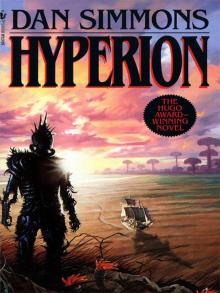 Hyperion
Hyperion The Crook Factory
The Crook Factory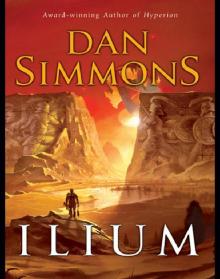 Ilium
Ilium Phases of Gravity
Phases of Gravity Hardcase
Hardcase Fires of Eden
Fires of Eden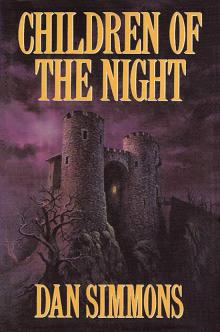 Children of the Night
Children of the Night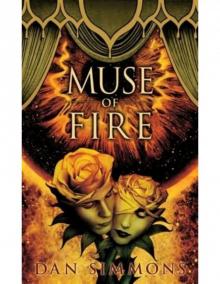 Muse of Fire
Muse of Fire Drood
Drood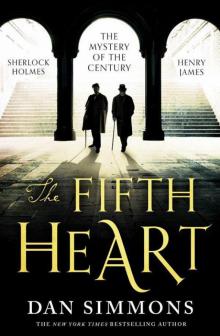 The Fifth Heart
The Fifth Heart Carrion Comfort
Carrion Comfort The Hollow Man
The Hollow Man Summer of Night
Summer of Night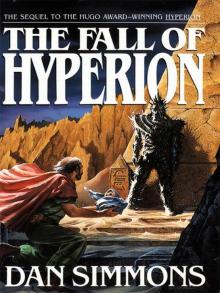 The Fall of Hyperion
The Fall of Hyperion Black Hills
Black Hills A Winter Haunting
A Winter Haunting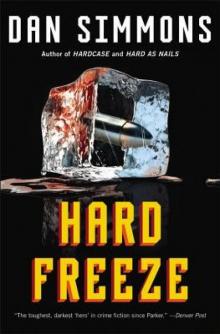 Hard Freeze
Hard Freeze Prayers to Broken Stones
Prayers to Broken Stones Hard as Nails
Hard as Nails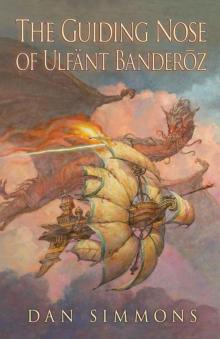 The Guiding Nose of Ulfant Banderoz
The Guiding Nose of Ulfant Banderoz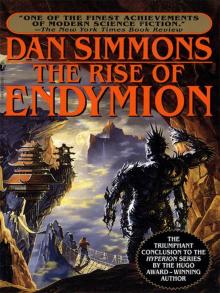 The Rise of Endymion
The Rise of Endymion Orphans of the Helix
Orphans of the Helix Lovedeath
Lovedeath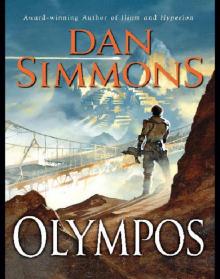 Olympos
Olympos Darwin's Blade
Darwin's Blade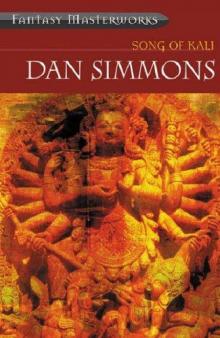 Song of Kali
Song of Kali Worlds Enough & Time: Five Tales of Speculative Fiction
Worlds Enough & Time: Five Tales of Speculative Fiction The Abominable
The Abominable The Death of the Centaur
The Death of the Centaur Hard as Nails jk-3
Hard as Nails jk-3 Worlds Enough & Time
Worlds Enough & Time Joe Kurtz Omnibus
Joe Kurtz Omnibus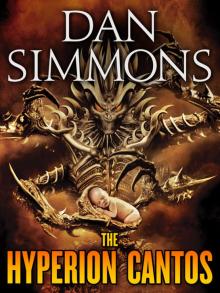 The Hyperion Cantos 4-Book Bundle
The Hyperion Cantos 4-Book Bundle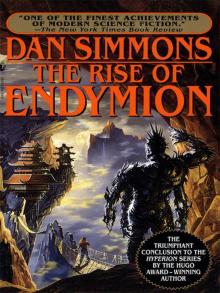 Rise of Endymion
Rise of Endymion Hard Freeze jk-2
Hard Freeze jk-2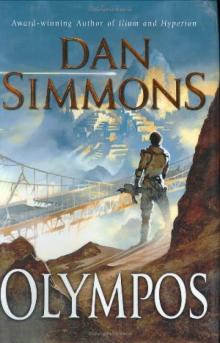 Olympos t-2
Olympos t-2 The Abominable: A Novel
The Abominable: A Novel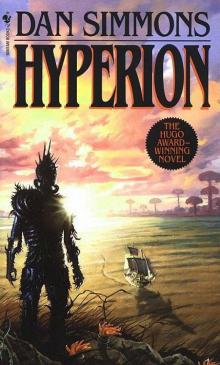 Hyperion h-1
Hyperion h-1 Remembering Siri
Remembering Siri Black Hills: A Novel
Black Hills: A Novel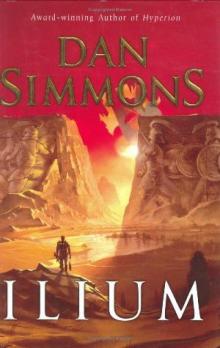 Ilium t-1
Ilium t-1 Hardcase jk-1
Hardcase jk-1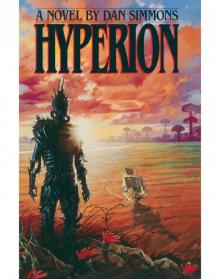 Hyperion 01 - Hyperion
Hyperion 01 - Hyperion